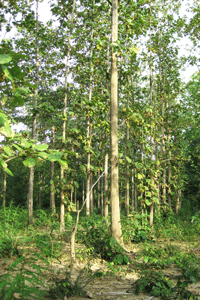International World Conference on Teak announce 2013 as Year of Teak
A world conference on Teak has just been held in Thailand, late March, and gathered experts from 34 countries and several international organisations to discuss the future of teak from its use by smallholders in e.g. Indonesia to large scale investments in Asia and Latin America. Among the conclusions of the conference were that there is a need to conserve and develop the genetic resources of teak to improve its future use. Researchers from the University of Copenhagen participate in the work.
 Among the international organisations represented at the conference were the Food and Agriculture Organisation of the United Nations (FAO), the International Tropical Timber Organisation (ITTO), the International Union of Forest Research Organisations (IUFRO) and the World Agroforestry Centre (ICRAF).
Among the international organisations represented at the conference were the Food and Agriculture Organisation of the United Nations (FAO), the International Tropical Timber Organisation (ITTO), the International Union of Forest Research Organisations (IUFRO) and the World Agroforestry Centre (ICRAF).
The conference was hosted by Thailand under the auspices of The Plant Genetic Project in Thailand under the Royal Initiative of Her Royal Highness Princess Maha Chakri Sirindhorn. The conference was honoured by the opening address of Her Royal Highness.
Among the speakers of the conference was Professor Erik Dahl Kjær from the University of Copenhagen, who presented results from genetic studies of teak over several decades.
Quality teak is becoming scarce
Teak (Tectona grandis) grows naturally in parts of Myanmar, Thailand and India, and is known by most people for its use in houses, furniture and ship building. However, there is not much natural forest with Teak left and there is a need to strengthen the work on growing teak in man-made forests and other tree plantings. Thailand, which earlier exported teak timber for e.g. Denmark, nowadays import more teak than they export and the same accounts for India. High quality teak has become scarce and is traded at very high prices. Teak has therefor become one of the most important plantation species and is widely grown in Asia, Africa and Latin America, ranging from a source of income of smallholders in Indonesia and other developing countries to long term and large scale investments in Asia and Latin America by e.g. western pension funds. There are many opportunities for increasing the production of valuable high quality teak form the world’s plantations but also many challenges and here research can assist in providing solutions.
Danish experts are involved
Denmark and the University of Copenhagen has a particular expertise in teak, primarily through the former Danida Forest Seed Centre which in the 1970’ies and 80’ies co-ordinated a major international effort on testing the growth of teak across countries and continents under the auspices of FAO. The co-operation between Danida and Thailand on teak goes even further back.
Today international co-operation is continued through the international network on Teak called TEAKNET. TEAKNET was established at the initiative of FAO in the early 90’ies and the chairmanship of TEAKNET is currently held by research leader at the University of Copenhagen, Lars Graudal, with secretariat and co-ordinator hosted by Kerala Forest Research Institute in India. The Conference was the ninth international conference on teak since TEAKNET began operating. The next International Teak Conference is planned for 2015.
More information: Lars Graudal (lgr@life.ku.dk) or Erik Dahl Kjær (edk@life.ku.dk), World Teak Conference 2013: www.worldteak2013.org, TEAKNET: www.teaknet.org.
